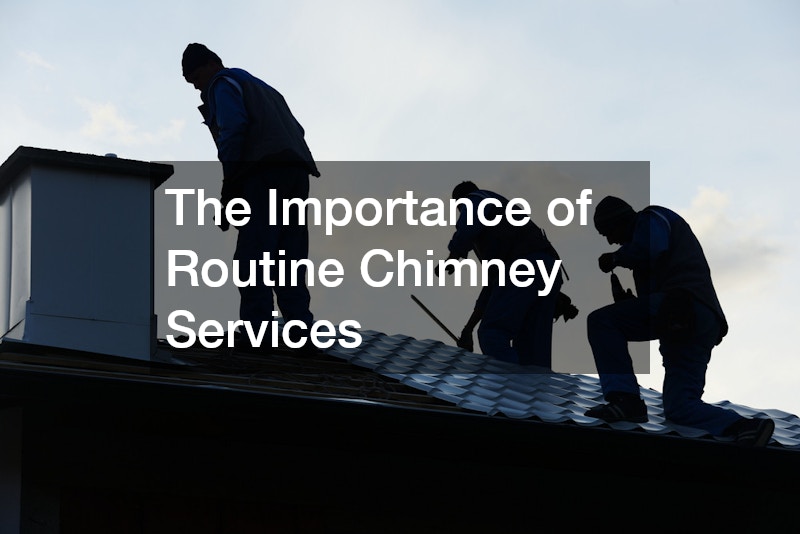
For homeowners with fireplaces or wood-burning stoves, the chimney plays a vital yet often overlooked role in maintaining a safe, efficient, and comfortable home. While it may seem like a static part of your house, your chimney is constantly exposed to heat, smoke, soot, and environmental elements. Over time, this exposure can cause blockages, structural issues, and dangerous buildup that compromise both safety and performance. Understanding the significance of routine chimney services is crucial for protecting your property, improving heating efficiency, and preventing costly or even life-threatening problems down the line.
Why is Regular Chimney Cleaning Important?
The most pressing reason for routine chimney cleaning is fire prevention. As wood or fuel burns, it produces creosote—a sticky, flammable residue that coats the inside of the chimney.
Video Source
If left unchecked, creosote buildup can ignite, causing a dangerous chimney fire that may spread to the rest of your home. Cleaning also removes soot and debris that hinder airflow, ensuring that smoke and harmful gases are vented properly.
Beyond safety, regular cleaning boosts efficiency. A clean chimney allows your fireplace or stove to burn fuel more completely, generating more heat while using less wood or gas. This not only makes your home more comfortable during cold months but also reduces energy costs over time.
What Are the Signs Your Chimney Needs Inspection?
Even without a set schedule, certain warning signs indicate it’s time to have your chimney inspected. Excessive smoke entering the home during fireplace use is a red flag, as it can mean a blockage or poor draft. Unpleasant odors coming from the fireplace, especially during warm weather, often point to creosote buildup or trapped moisture.
You might also notice visible soot or creosote deposits around the fireplace, damaged bricks or mortar, or white staining on the chimney exterior (known as efflorescence). These symptoms suggest underlying problems that could worsen if not addressed promptly. Finally, if you hear scratching or movement, animals or birds may have built nests inside, creating hazardous obstructions.
How Often Should You Have Your Chimney Serviced?
The frequency of chimney service depends on factors like usage, fuel type, and local climate. The National Fire Protection Association recommends that chimneys be inspected at least once a year, regardless of how often they’re used. For homes that rely heavily on fireplaces or wood stoves during winter, a cleaning every burning season is advisable.
If you burn softwoods, which produce more creosote than hardwoods, or if your chimney is exposed to high moisture levels, you may need more frequent maintenance. Gas fireplaces generally produce less soot, but should still be checked annually to ensure ventilation systems are clear and functioning properly.
What Does a Professional Chimney Service Include?
A professional chimney service goes far beyond a quick sweep. The process typically begins with a thorough inspection—either visual or aided by cameras—to check for cracks, blockages, or structural damage. During cleaning, specialized brushes and vacuums remove soot, creosote, and any debris, including leaves, animal nests, or broken flue liners.
In addition to cleaning, a full service may include repairing mortar joints, replacing damaged flue liners, installing or replacing chimney caps, and sealing leaks to prevent water damage. Professionals also ensure that the damper is functioning correctly and that the chimney structure is stable. This comprehensive approach not only addresses immediate issues but also prevents future problems from developing.
What Are the Risks of Neglecting Chimney Maintenance?
Neglecting chimney care can lead to serious consequences. The most dangerous risk is a chimney fire, which can cause extensive property damage and put lives at risk. Blocked chimneys can also cause dangerous gases, such as carbon monoxide, to back up into your home, posing severe health hazards.
Structural damage from moisture, freeze-thaw cycles, or acidic creosote can weaken the chimney over time, leading to expensive repairs or even full replacement. Additionally, poor ventilation reduces heating efficiency, meaning higher energy bills and less warmth during cold weather. In the worst cases, neglect can render your fireplace or stove unusable until major repairs are made.
Routine chimney services are far more than a simple cleaning—they are a critical investment in the safety, efficiency, and longevity of your home. By preventing fire hazards, improving air quality, maintaining structural integrity, and ensuring optimal heating performance, professional chimney maintenance safeguards both your property and your family. A yearly inspection and timely cleaning can save you from costly repairs, dangerous accidents, and inefficient heating. Treat your chimney as the vital system it is, and it will reward you with warmth, comfort, and peace of mind for years to come.
